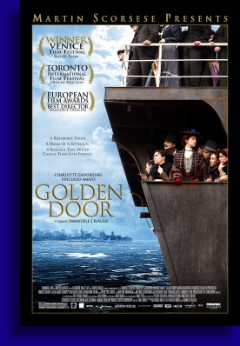

Reviewed by
Christopher Armstead


Our weekend trip around the world has ended, and thankfully so because if I have to read another subtitle I’m going to slap somebody, in turn of the century Italy where director Emanuele Crialese paints a lyrical picture of the Mancuso family and their harsh struggle to get to this new world they’ve heard so much about named America.
As far as I can tell, Italy around the early 1900’s is a bunch of rocks and rough terrain as the patriarch of the Mancuso family, Salavatore (Vincenzo Amato) navigates this rocky terrain, sans shoes because they don’t own any, with his son Angelo (Francesco Casisa). What Salvatore and child are attempting to get to, with rocks in their mouths, is a shrine of sorts which he hopes will give him guidance as to whether or not to uproot his family and relocate them to America. A sign comes in the form of his youngest son, the mute Pietro (Filippo Pucino) who brings him a couple of photos of like the biggest onion you’ve ever seen and some kid standing next to a ‘Food of the Gods’ sized chicken. Personally that would scare me off of this freaky deformed place, but somehow Salvatore has interpreted this as sign that it is time to move on.
Now with his decision all made up, the widowed Salvatore and his boys get some fresh duds, can’t you go to the new world where the rivers are made of fresh milk looking like a ragamuffin now can we, grabs a hold of a couple local young women in Rita (Fredrica De Cola) and Rosa (Isabella Ragonese) who have husbands picked out and waiting for them in the new land. He then convinces his extremely cranky in independent minded mother Fortunata (Aurora Quattrocchi) to come along and then they start their perilous journey across the rough terrain of Italy and through the unorganized processing center to secure a seat on the boat.


Once on the boat, which is standing room only for real, the Mancuso’s have picked a passenger friend in the fiery haired pale skinned Englishwoman Luce Reed (Charlotte Gainsbourg) who has a mysterious history behind her that is only rumored about on the boat but never explained. Luce, as it turns out, is going to need some help to get processed once she gets to America and has chosen Salvatore to be the one to assume the role of her fiancée, which he readily accepts. Then once the boat arrives in America we are given a detailed view of the bureaucracy involved in processing aliens and the hoops and hurdles that those hoping to gain entry have to jump through.
‘The Golden Door’ is a very strange film on a number of levels. First off the film has no real plot to speak of as we are given a window to look through and observe the life of these individuals and what they had to go through to gain entry to the United States. To that effect ‘The Golden Door’ plays a lot like a dramatized history lesson, the kind you will see on the Discovery Channel occasionally. Further bolstering this history lesson feel of the film, as opposed to a dramatic narrative, is the fact that we aren’t given a lot of information about the characters we are observing. We learn next to nothing about the character of Luce Reed who is almost a spectre throughout the movie in both character and look. We aren’t given much information about Salvatore either, other than the fact he’s a widow with a couple of sons, has a twin brother somewhere in United States and is prone to extravagant dreamlike flights of fancy.
Nonetheless, despite the sketchy characterizations and the lack of a plot driven narrative, Crialese along with his cinematographer Agnes Goddard have managed to create a very vibrant story told through vivid imagery and a pair of grand performances by Vincenzo Amato and Aurora Quattrocchi. With a minimum of dialog, the landscape that Crialese films of Sicily has a story to tell all its own, or witnessing the face of Salvatore Mancuso, without saying much of anything and watching his face and movements tell his story and what he hopes to find and discover when he gets to this place he has been told these fantastic fairy tales about. Where Amato succeeded in character with silence, Quattrocchi succeeds in chatter as the witty character of Fortunata complains constantly, bickers with anyone and everyone and is completely disagreeable. Quattrocchi captures the feel of an older woman who was content with her old life and the old world and the old ways and only came along to appease her son and grandchildren.
‘The Golden Door’ is a different kind of film, filled with images of stark reality sprinkled with scenes of fantasy and wonder. It is deliberate in its pace and may move a little too slowly at times but for the most part, given a chance, it will capture your imagination and take you to a place you’ve never been which is a very high compliment that just about any film should be happy to receive.

